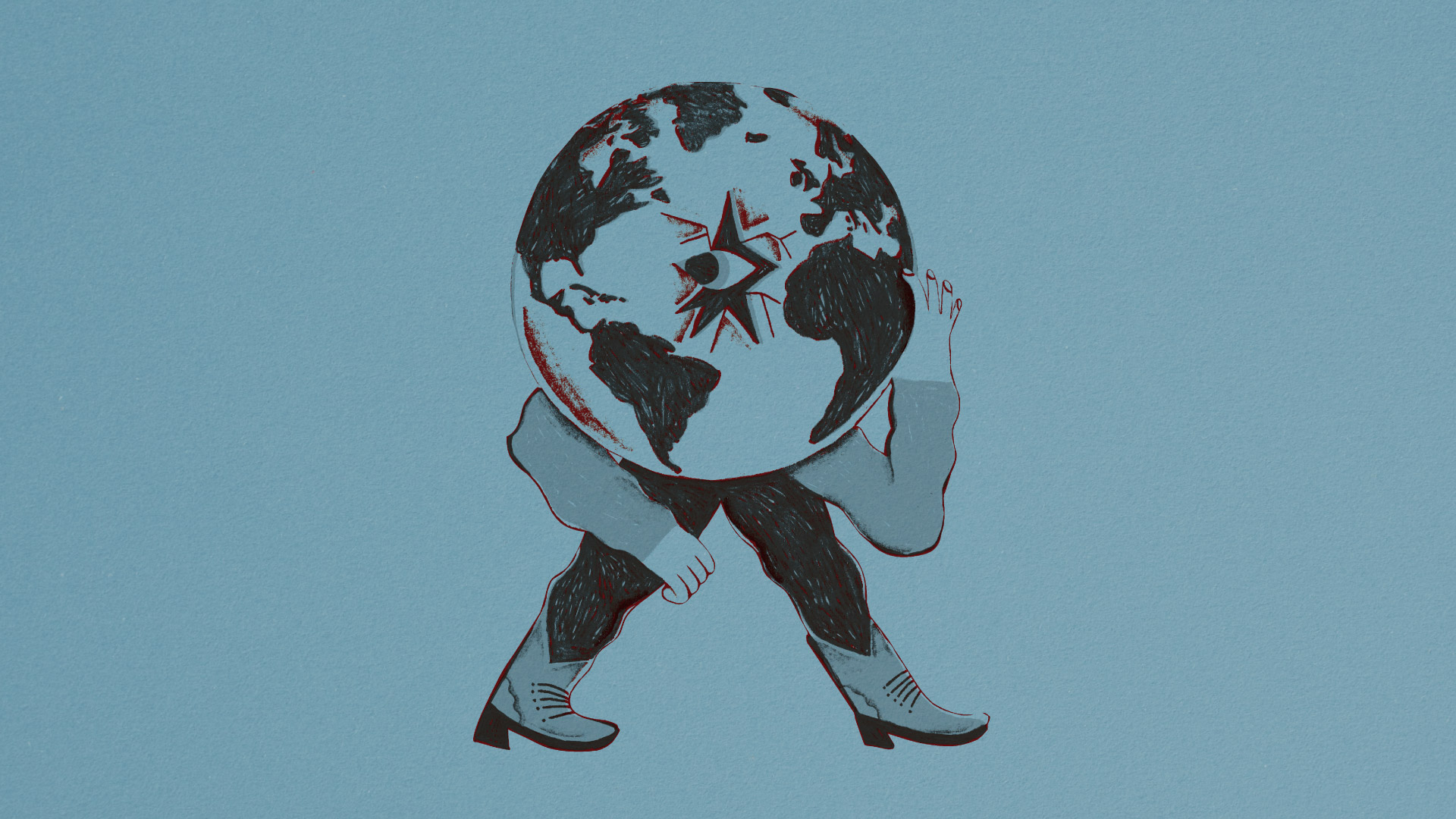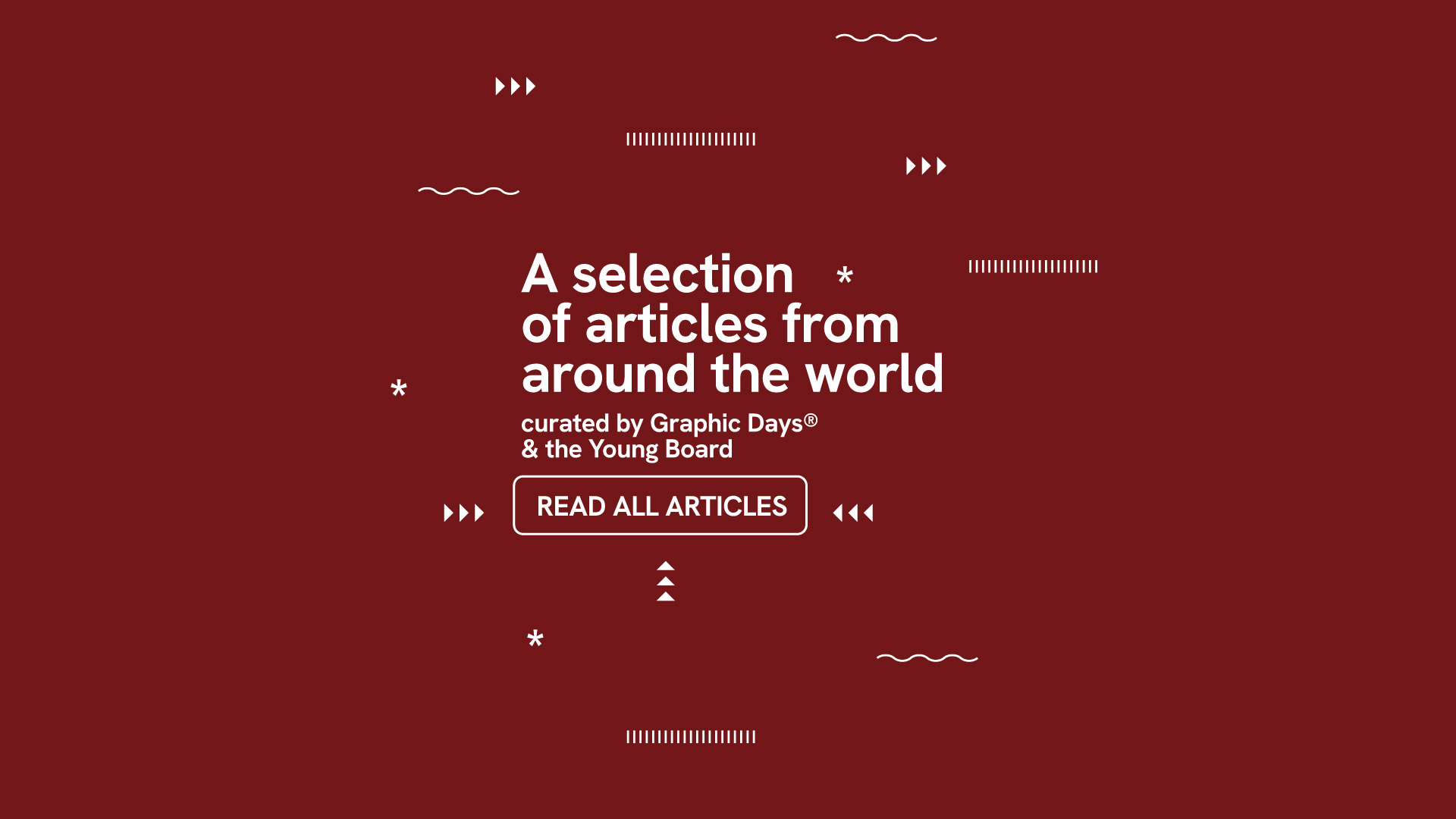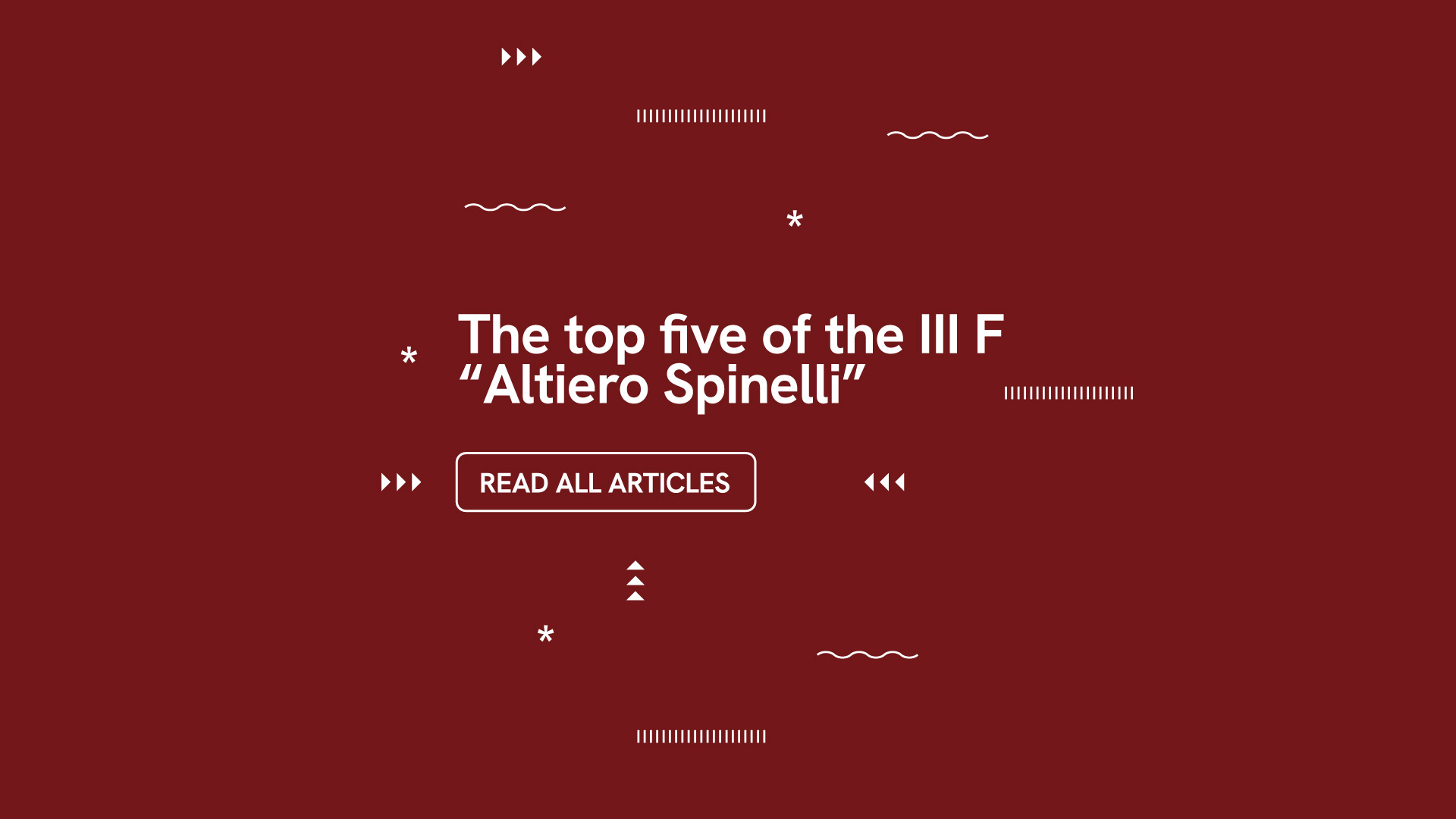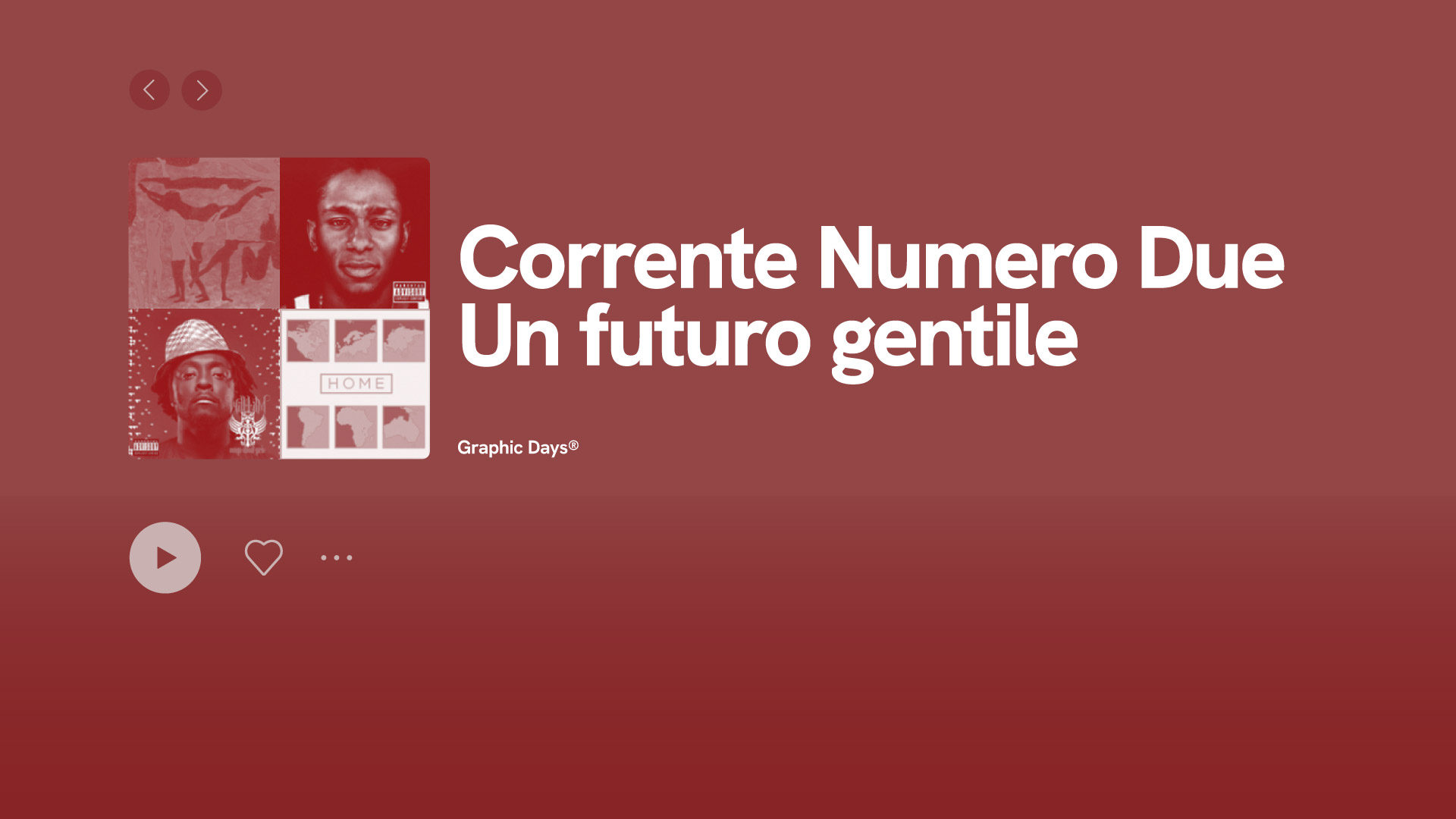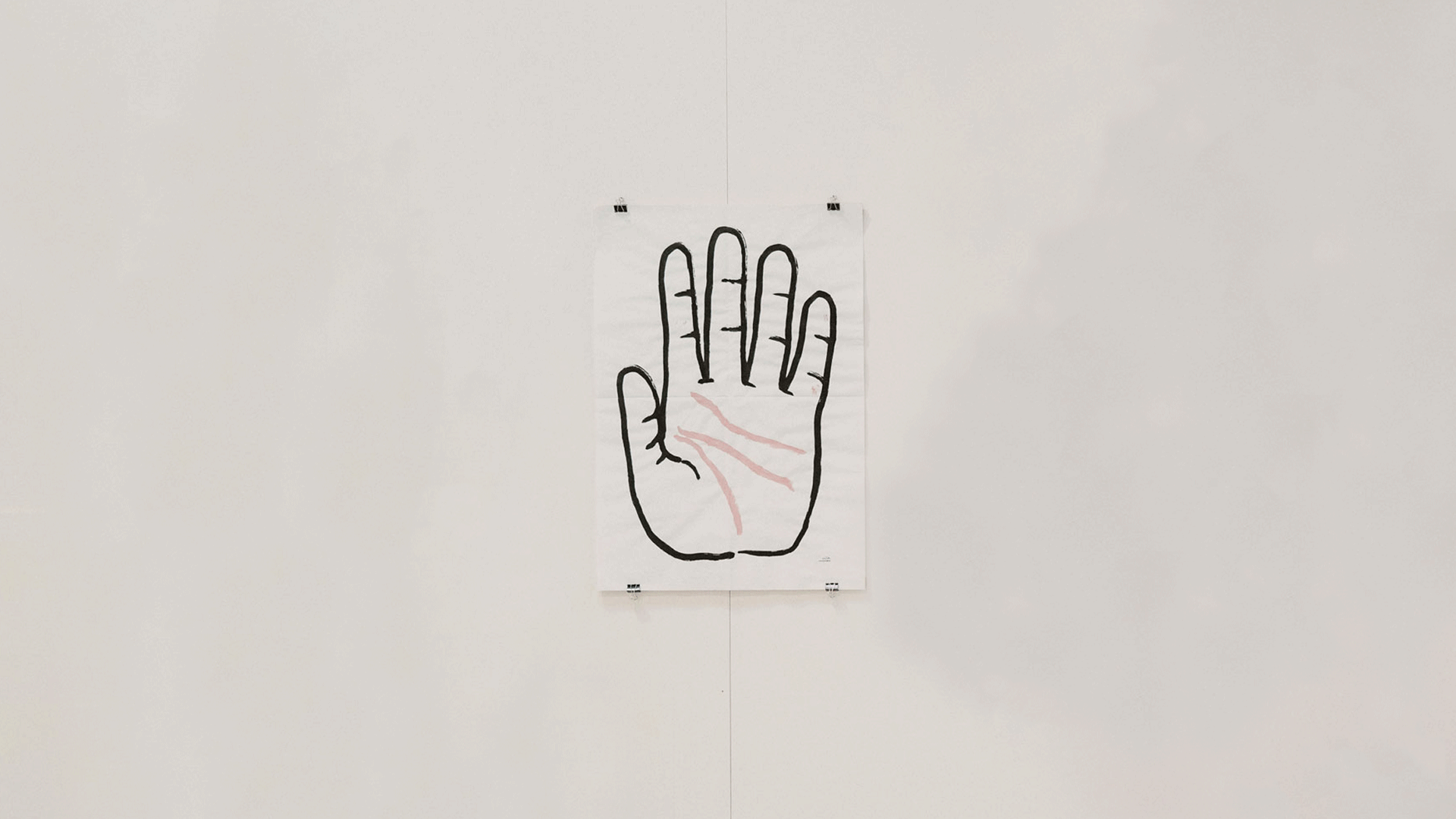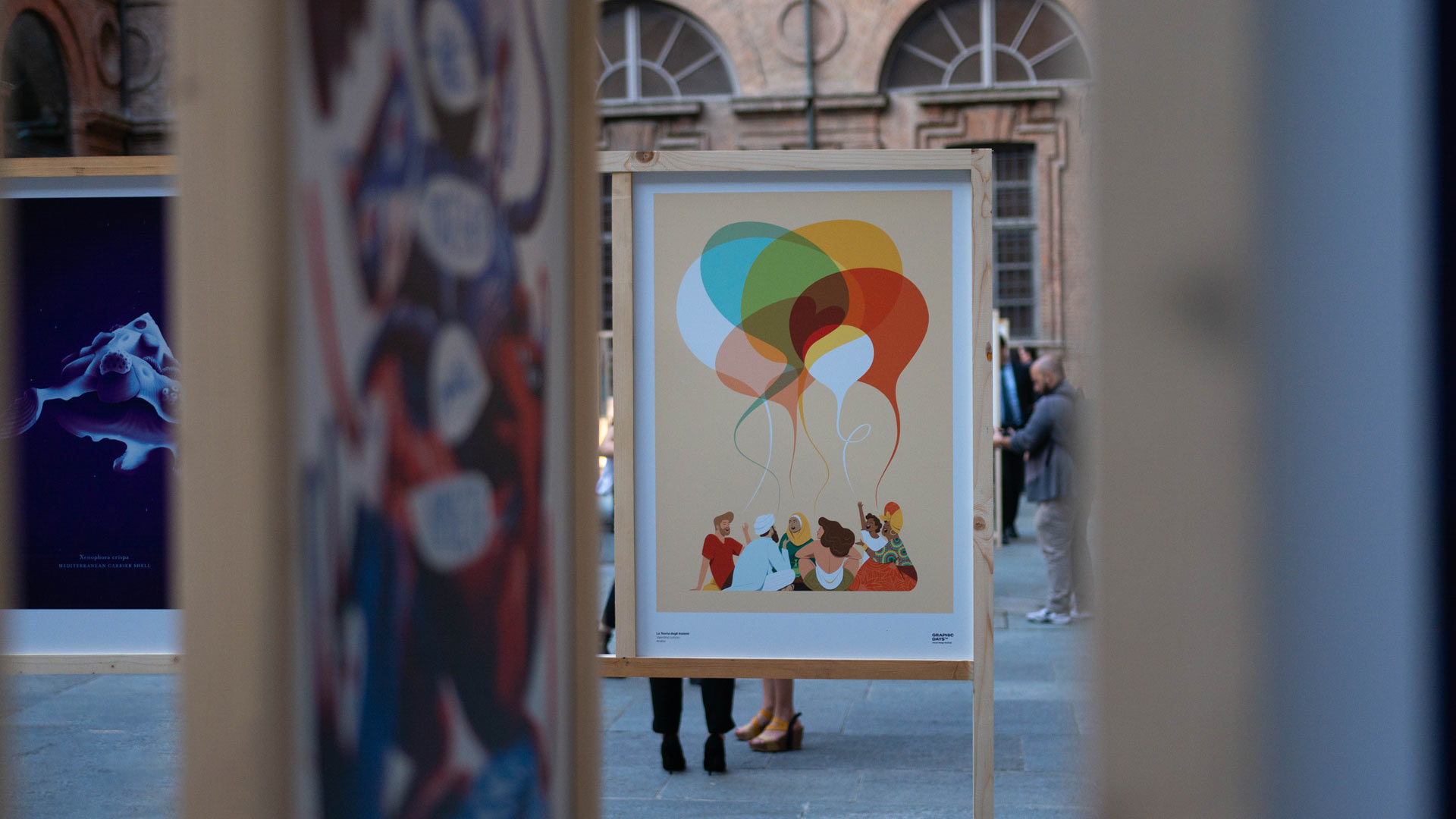Imagining a kind future means thinking about the environment and the kind of impact each person has on the ecosystem. We are faced every day with choices, so-called ethical dilemmas to which it is often difficult to give answers.
Giacomo Moro Mauretto aka Entropy for life recently published a volume entitled “If I plant a tree can I eat a steak?” in which he addresses this issue and calls for reliance on science. However, it is not always enough: content creator Elisa Nicoli (@eco.narrator) in a TED conference highlights the findings of a Danish study comparing the life-cycle environmental impact of a disposable plastic bag with an organic cotton bag; it emerges that the cotton bag would have to be used 20 thousand times to equalize the environmental weight of the plastic bag.
Does this mean that the number one enemy of the environment, plastics, becomes a viable solution again instead? Of course not. but it does mean that environmental issues are complex and cannot be addressed through dichotomous simplifications.
Often the speed of communication risks producing trivializations designed to create buzz and attract attention, at the expense of in-depth analysis; tones that favor a dramatic narrative on environmental issues sometimes achieve the opposite effect because they are repelling. These assumptions gave rise to Greencome, a digital communication platform, which uses a different approach by offering positive stories to raise awareness and bring about impact.
Stories of changemakers
From the headlines to the incessant notifications on our devices, we find ourselves constantly immersed in an uninterrupted stream of negative news, characterized by catastrophes and seemingly insurmountable problems. This is where Greencome comes in, a ‘new media’ that aims to mobilize people and organizations in the fight against climate change, creating awareness and giving the tools to combat the most important challenge of our time. The goal is to promote purposeful dialogue, focusing not only on problems and negative news, but also on solutions and stories that “do good” for the Planet. Below are some of the extraordinary changemaker stories that can inspire change in each of us.
“The House of Fish,” Paolo Fanciulli
Paolo Fanciulli, a Tuscan fisherman, has been campaigning since the 1980s against bottom trawling, a technique that destroys the seabed and causes irreversible damage to biodiversity. In 2006, with his non-profit organization, he installed marble sculptures on the seabed of Tuscan seas. The sculptures act as obstacles to trawling, making it impractical. In the areas where the works are present, nature has regained the upper hand and organisms have repopulated the seabed. Today, thanks to this project, a true underwater museum has been created.
‘’FabBRICK”, Clarisse Merlet
While studying at Paris-Malaquais University, Clarisse Merlet became aware of the enormous environmental impact of the construction industry, which is responsible for 37 percent of global carbon dioxide emissions. But it is another fact that particularly upsets her: every second the equivalent of a truckload of textile materials is thrown into landfills. From the very combination of these two problems, Clarisse develops an ingenious solution. She turns discarded clothes into fibers, molds them, and then adds an environmentally friendly glue: an environmentally sustainable brick is thus formed. From this project she later founded FabBRICK, a company that helps businesses recover their textile waste and turn it into design products, furniture and thermal/acoustic insulation.
“Releaf”, Valentin Frechka
When Valentin Frechka, a bioengineering student at Kiev National University, discovers that about 3 million hectares of forests are being cut down each year for paper production, he decides to address this issue with an innovative idea. He collects leaves from sidewalks and parks, breaks them down into fibers, mixes them with water and environmentally friendly additives, and thus obtains, an environmentally sustainable pulp that is then processed into quality paper. From this idea born between school desks, Valentin later founded Releaf, a company that produces sustainable paper from organic waste, cutting CO2 emissions by 78 percent.
Greencome
In 2022, among the corridors of the University of Turin, Duccio Travaglini, Ginevra Zolli and Simone Cagnazzo started Greencome, a vertical “new media” on environmental sustainability.
@greencome_ita
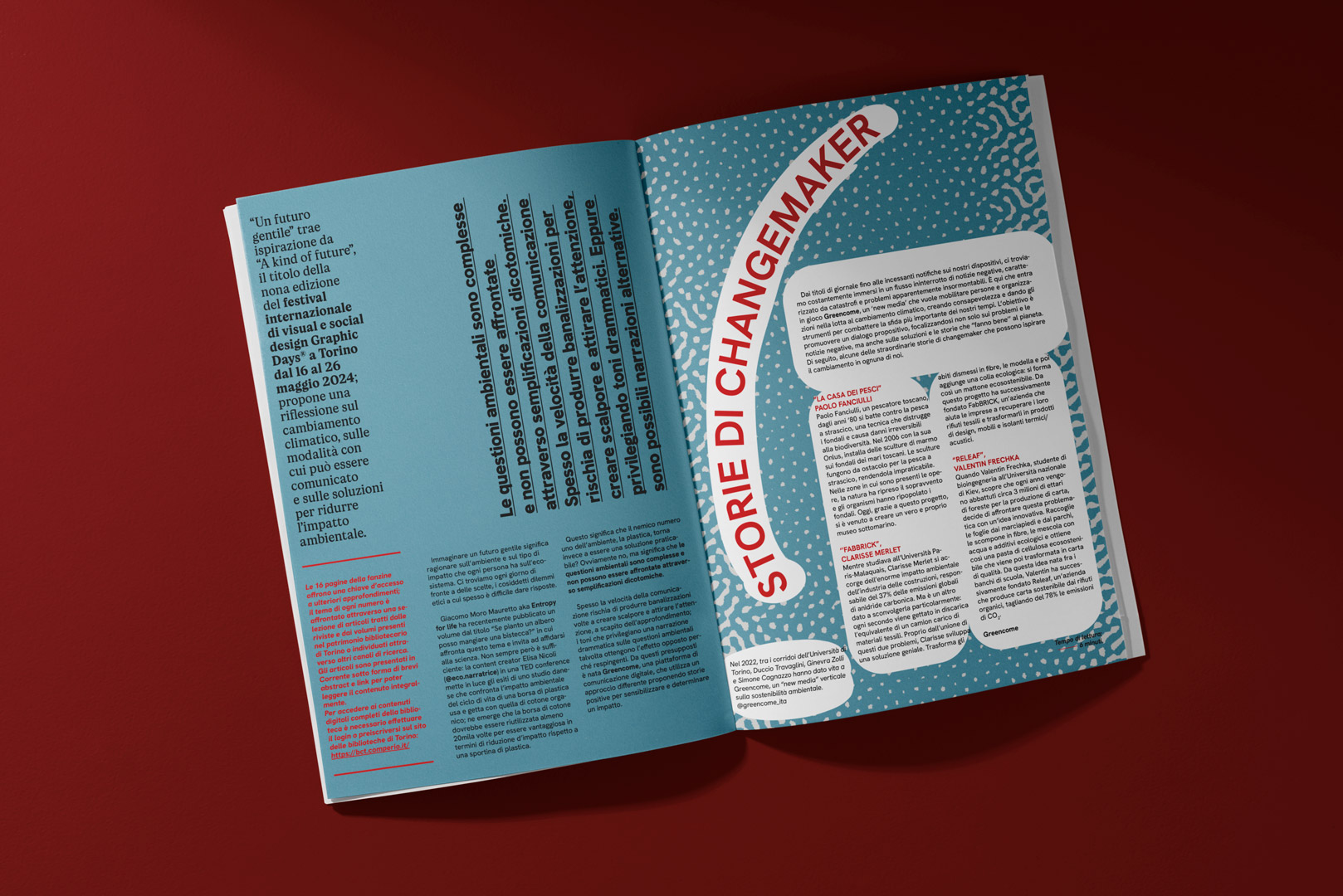
What are we leaving to future generations?
Probably a starless sky, according to estimates by the German Research Center for Geosciences. Unless certain measures are taken, such as shielding outdoor lights or pointing them downward.
Technology, often a source of pollution, however, can offer help in reducing its impact on the environment. This is the case with the experiences of murals made with anti-smog paints, or the hydrogen-powered factory, or even the use of artificial intelligence to optimize the use of resources.
Many disciplines have become aware of the need for concrete action to address climate change: from innovations from the fashion industry to the adoption of architectural solutions from Arab countries to hydroponic agriculture inside buildings.
An open knot remains that of e-waste management, on which Italy lags behind the required European standards, but this could change: awareness of the issue is growing and there are numerous proposals to encourage recycling.
The choice of language and the way in which these issues are communicated affects the possibility of getting the message across; thus, a new film genre, somewhere between science fiction and dystopia, called “Climate fiction” was born that explores the consequences of climate change. And the Design Declares communication campaign reminds designers and designers around the world that they can play a crucial role in encouraging sustainable actions.
While the battle to save the Panda, WWF’s iconic animal, has made significant strides to the point that it is no longer considered endangered, under threat now is the human species. With this message, WWF brings attention back to the importance of reducing pesticide use to protect the planet and people’s health.
Concern about the future of the environment is widespread, so much so that it has made it necessary to coin a new term: eco-anxiety. However, every cloud has a silver lining: parallel to the rise of this phenomenon is an increase in activism and attention to climate-related policies. From Arizona also comes good news: tropical forests are showing resilience to rising temperatures, preserving their role in absorbing CO2.
To reduce the impact on the planet, everyone can do their part: the Too good to go app, for example, helps limit food waste. But choosing how we treat our bodies at the end of life can also help reduce our environmental footprint.
The proposed selection is the outcome of the editorial workshops conducted with Class IIIF of the European International State School “Altiero Spinelli” in Turin, following research that each student conducted independently and within the Alberto Geisser Library.
Students: Giulia Barile, Caterina Bosco, Vittoria Bottacini, Giorgia Bracciani, Olivia Bresso, Rebecca Costamagna, Alessia Cottafava, Viola Crisafi, Silvia Dalle Nogare, Aurora Della Torre, Lorena Fartadi, Aurora Giordano, Letizia Jitaru, Stella Lunardi, Victoria Marquardt, Simone Martino, Andrea Minasso, Lorenzo Moreschini, Francesca Renzone, Elena Ricca, Matilde Scimeca, Gabriele Tarditi, Bianca Turletti, Irene Volpe, Giulia Zecchini
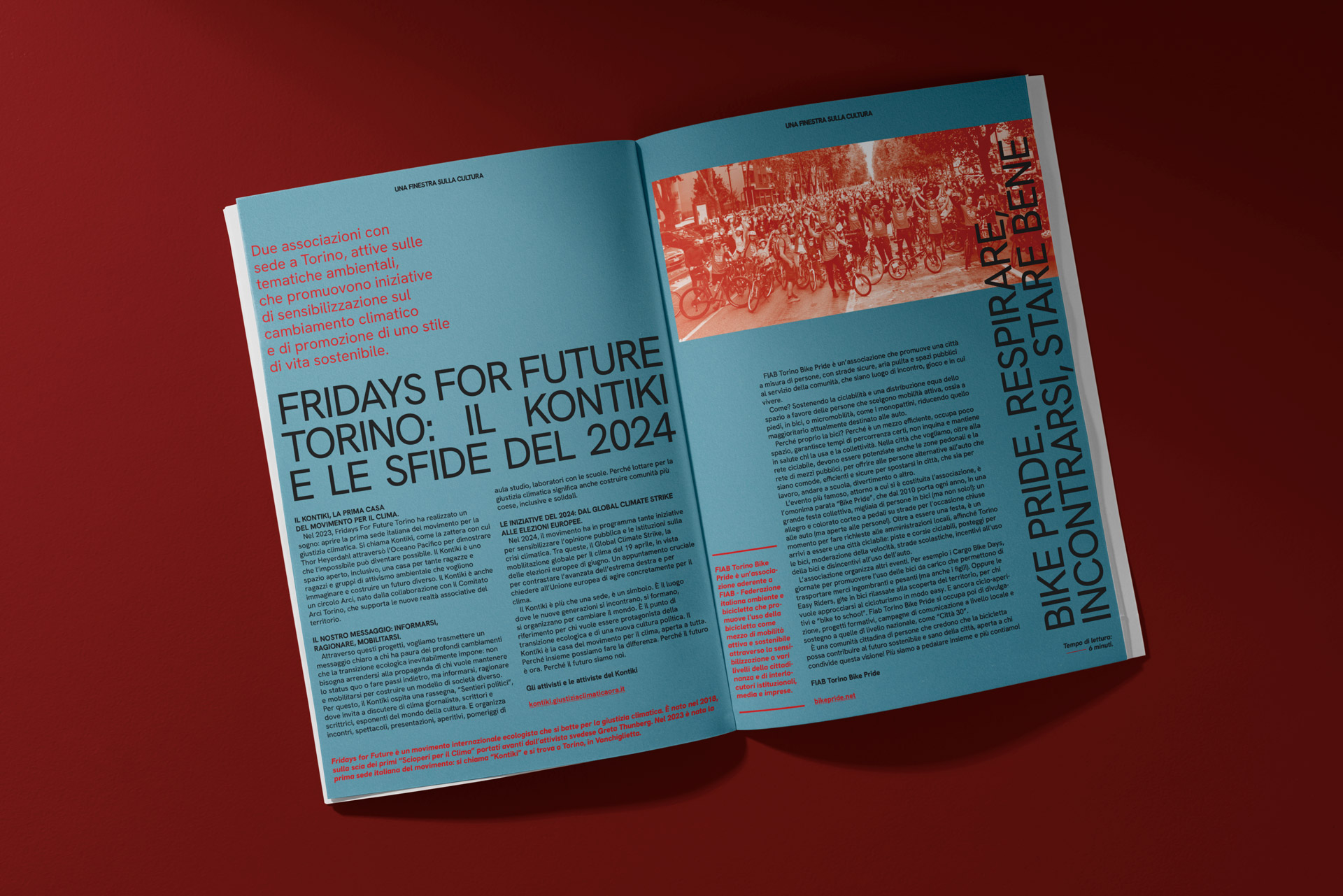
Fridays For Future Torino: the Kontiki and the challenges of 2024
The Kontiki, the first home of the climate movement.
In 2023, Fridays For Future Torino realized a dream: to open the first Italian headquarters of the climate justice movement. It is called the Kontiki, after the raft with which Thor Heyerdahl crossed the Pacific Ocean to prove that the impossible can become possible.The Kontiki is an open, inclusive space, a home for many girls and boys and environmental activism groups who want to imagine and build a different future.The Kontiki is also an Arci club, born from the collaboration with the Arci Torino Committee, which supports new associative realities in the area.
Our message: inform, reason, mobilize.
Through these projects, we want to send a clear message to those who are afraid of the profound changes that the ecological transition inevitably imposes: we must not surrender to the propaganda of those who want to maintain the status quo or take steps backward, but to inform, reason, and mobilize to build a different model of society. For this, the Kontiki hosts a review, “Political Paths,” where it invites journalists, writers, cultural figures to discuss climate.
And it organizes meetings, performances, presentations, aperitifs, classroom afternoons, and workshops with schools. Because fighting for climate justice also means building more cohesive, inclusive and sustainable societies.
The 2024 initiatives: from the Global Climate Strike to the European elections.
In 2024, the movement has many initiatives planned to raise public and institutional awareness of the climate crisis. These include the Global Climate Strike, the April 19 global climate mobilization ahead of the European elections in June.
A crucial date to counter the advance of the far-right and to call on the European Union to take concrete action on climate.
The Kontiki is more than a venue, it is a symbol. It is the place where new generations meet, train, and organize to change the world. It is the reference point for those who want to be protagonists of the ecological transition and a new political culture. The Kontiki is the home of the climate movement, open to all. Because together we can make a difference. Because the future is now. Because the future is us.
Kontiki activists
Fridays for Future is an international environmental movement fighting for climate justice. It was born in 2018, in the wake of the first “Climate Strikes” led by Swedish activist Greta Thunberg. In 2023, the first Italian branch of the movement was born: it is called “Kontiki” and is located in Turin, in Vanchiglietta. https://kontiki.giustiziaclimaticaora.it/
Bike Pride. Breathe, meet, feel good
FIAB Torino Bike Pride is an association that promotes a people-friendly city with safe streets, clean air and public spaces that serve the community and are a place to meet, play and live in.
How? By promoting bicycling and an equitable distribution of space in favor of people choosing active mobility, i.e., walking, biking, or micromobility, such as scooters, reducing the majority one currently allocated to cars.
Why specifically the bicycle? Because it is an efficient means of transportation, takes up little space, guarantees certain travel times, does not pollute, and keeps those who use it and the community healthy. In the city we want, in addition to the bicycle network, pedestrian zones and the public transportation network must also be enhanced to provide people with alternatives to the car that are comfortable, efficient, and safe for getting around the city, whether it is for work, school, fun, or anything else.
The most famous event, around which the association was formed, is the “Bike Pride” parade of the same name, which since 2010 has brought thousands of people on bicycles (but not only!) in a big collective celebration every year: a cheerful and colorful procession on pedals on streets closed to cars for the occasion (but open to people!). In addition to being a celebration, it is a time to make requests to local governments, so that Turin will come to be a bike-friendly city: bike lanes and paths, bike parking, speed moderation, school roads, incentives to bike use and disincentives to car use.
The association organizes other events. For example, Cargo Bike Days, days to promote the use of cargo bikes that allow people to transport bulky and heavy goods (but also their children!). Or Easy Riders, relaxed bike rides to discover the area, for those who want to approach cycling tourism in an easy way. And also cyclo-aperitifs and “bike to school.” Fiab Torino Bike Pride is then involved in outreach, educational projects, communication campaigns at the local level and support for those at the national level, such as “City 30.”
It is a city community of people who believe that cycling can contribute to the city’s sustainable and healthy future, open to those who share this vision! The more of us who ride together, the more we matter!
FIAB Torino Bike Pride
FIAB Torino Bike Pride is a member association of FIAB – Italian Environment and Bicycle Federation that promotes the use of bicycles as a means of active and sustainable mobility by raising awareness at various levels of the citizenry and institutional stakeholders, media and businesses.
Books
Dove vanno a finire i nostri rifiuti? by Mario Grosso and Maria Chiara Montani, Zanichelli, 2015
Trash: tutto quello che dovreste sapere sui rifiuti by Piero Martin and Alessandra Viola, Codex, 2017. Available at the Central Library and Villa Amoretti
Le ragazze del futuro: Greta Thunberg, Helena Gualinga, Vanessa Nakate, Helena Neubauer: le nuove leader globali dei FFF by Serena D’Angelo, Marco Vassalotti, Francesco Foti and Valentina Stecchi, People, 2024
Effetto serra, effetto guerra by Grammenos Mastrojeni and Antonello Pasini, Chiarelettere, 2017. Available at the Central Library
Atlas of the Invisible: Maps & Graphics That Will Change How You See the World by James Cheshire e Oliver Uberti, Particular Books, 202
Come funziona davvero il mondo: energia, cibo, ambiente, materie prime; le risposte della scienza by Vaclav Smil, Einaudi, 2022. Available at Turin’s civic libraries
Film, documentaries and TV series
Nausicaä of the valley of the wind. Directed by Hayao Miyazaki, animation, 117’, 1984
Captain Fantastic. Directed by Matt Ross, comedy, 118’, 2016
Dark waters. Directed by Todd Haynes, biography, 126’, 2019
Don’t look up. Directed by Adam McKay, comedy, 138’, 2021
Suggestions from social networks
@eco.narratrice
@envronment
@green_pills
@eleonoraviaggi
@Shelbizleee
@entropyforlife
Altri progetti

